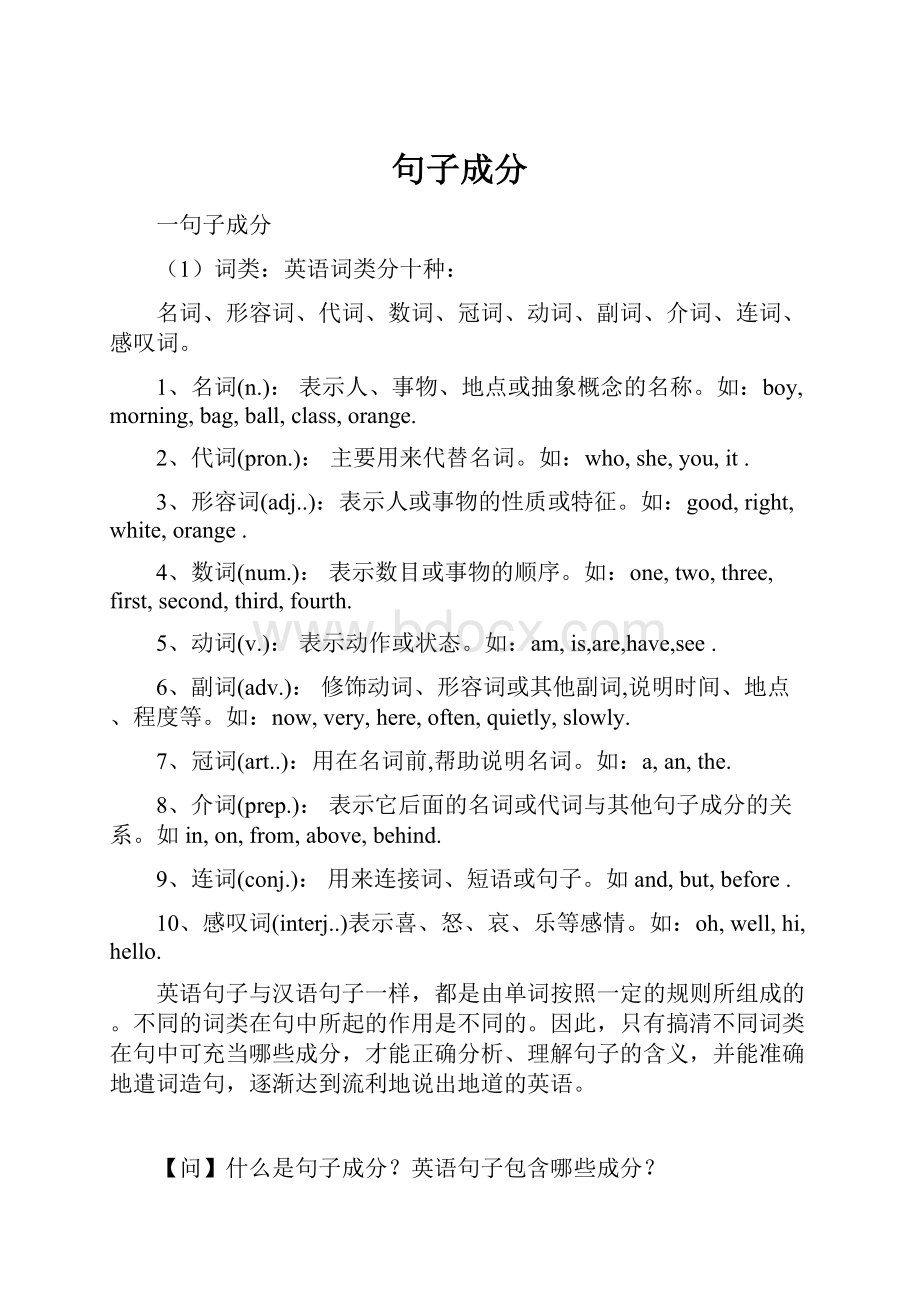句子成分.docx
《句子成分.docx》由会员分享,可在线阅读,更多相关《句子成分.docx(11页珍藏版)》请在冰豆网上搜索。

句子成分
一句子成分
(1)词类:
英语词类分十种:
名词、形容词、代词、数词、冠词、动词、副词、介词、连词、感叹词。
1、名词(n.):
表示人、事物、地点或抽象概念的名称。
如:
boy,morning,bag,ball,class,orange.
2、代词(pron.):
主要用来代替名词。
如:
who,she,you,it.
3、形容词(adj..):
表示人或事物的性质或特征。
如:
good,right,white,orange.
4、数词(num.):
表示数目或事物的顺序。
如:
one,two,three,first,second,third,fourth.
5、动词(v.):
表示动作或状态。
如:
am,is,are,have,see.
6、副词(adv.):
修饰动词、形容词或其他副词,说明时间、地点、程度等。
如:
now,very,here,often,quietly,slowly.
7、冠词(art..):
用在名词前,帮助说明名词。
如:
a,an,the.
8、介词(prep.):
表示它后面的名词或代词与其他句子成分的关系。
如in,on,from,above,behind.
9、连词(conj.):
用来连接词、短语或句子。
如and,but,before.
10、感叹词(interj..)表示喜、怒、哀、乐等感情。
如:
oh,well,hi,hello.
英语句子与汉语句子一样,都是由单词按照一定的规则所组成的。
不同的词类在句中所起的作用是不同的。
因此,只有搞清不同词类在句中可充当哪些成分,才能正确分析、理解句子的含义,并能准确地遣词造句,逐渐达到流利地说出地道的英语。
【问】什么是句子成分?
英语句子包含哪些成分?
【答】组成句子的各个部分叫做句子成分。
它包括:
主语、谓语、宾语、定语、状语、表语和宾语补足语等。
【问】各成分在句中的作用如何?
分别由哪些词及短语充当?
(2)句子成分
1.主语:
是句子要说明的人或事物,是句子的主体,一般由名词、代词、数词、不定式或动名词等充当。
如:
■Thecarisrunningfast./ThegirlcansingmanyEnglishsongs.(名词)
■Wearestudents./Thisismypen.Yoursisonthedesk.(代词)
■OneofmyclassmatesisfromShanghai./Twoandthreeisfinve.(数词)
■Theblindneedmorehelp.(名词化的形容词)
■It'sbadmannerstospitinpublic.(不定式)
■Eatingtoomuchisbadforyourhealth.(动名词)
■【注意】若不定式短语作主语常用it作形式主语,而把真正的主语(不定式短语)放在句后。
.2.谓语:
说明主语的动作或状态,也是句子的主体部分,一般由动词充当。
动词分为实义动词、连系动词、情态动词和助动词。
实义动词单独作谓语,连系动词与表语一起构成谓语,情态动词与省略to的不定式构成合成谓语,助动词与动词原形共同构成谓语部分。
如:
■由单一动词作谓语:
WeareChinese./HehasanEnglish-Chinesedictionary.
■情态动词加主要动词:
Wecanplaythepiano./Youmustseethedoctor.
■助动词加主要动词构成谓语:
Sheistalkingwithhersister.
■【注意】谓语与主语在人称与数方面要相互照应。
3.表语:
用于说明主语的身份、特征或感受,一般由名词、数词、形容词、分词等充当。
常用的连系动词有:
be,look,get,sound(听起来),feel,become,smell,turn,taste(尝起来)等。
如:
■Theyareworkers.(名词)
■Twoandthreeisfive.(数词)
■Thestoryisveryinteresting.(形容词)
■Myjob(工作)isteachingEnglish.(动名词)
■Sheisathome.(介词短语)
■Ifeelterrible.(形容词)
■Thedishtastesdelicious.(形容词)
■Heishere(副词)
■It’sgettingdark./Hegotveryangry.
■4,宾语:
是及物动词所涉及的对象,是动作的对象或承受者。
一般由名词、代词、不定式及动名词等充当。
如:
■Heisdoinghishomework./Isawaplaneintheskyjustnow.(名词)
■Theydidnothingthismorning.
■Iwantthree./Pleasepassmethefirst.(数词)
■Shewantstogohome.(不定式)
■Weenjoyplayingfootball.(动名词)
■【注意】①有的动词可接双宾语,间接宾语指人,直接宾语指物。
这类动词常见的有:
give,buy,tell等。
如:
■Heboughtmeabookyesterday
■XiaoLiuboughtadictionaryforTom.(直宾+间宾)
■②有的动词常用不定式作宾语,而不能用动名词。
这类动词有:
want,wish,hope等。
如:
■Ihopetoseeyouagain.
■③有的动词一般只用动名词作宾语,而不用不定式。
这类动词有:
enjoy,practise等。
如:
■HepractisesspeakingEnglisheveryday.
■Ienjoyreadingstorybooks
■④有的动词后接不定式与动名词含义不同。
■a)stoptodo(不定式为状语)表示“停下原来的事,去做另一件事”,stopdoing表示“停止做某事”。
如:
■Istoppedtotalkwithhim.(我停下来与他谈话。
)
■Thestudentsstoppedtalkingwhentheteachercamein.(老师进来时学生们停止谈话。
■注意:
英语中带有宾语的谓语动词叫及物动词,不带宾语的叫不及物动词。
及物动词后必须跟上宾语意义才完整,不及物动词本身意义已完整,后面不跟宾语。
■Youmayusemypen./Doyoulikefish?
(及物)
■Dickswimsverywell./Thesunrisesintheeast.(不及物)
■不及物动词可加介词再加宾语
■Wearelisteningtothemusic.
■Theyaretalkingtoeachother.
既可以作及物动词又可以作不及物动词的词:
■Mymotherteachesinthisschool./SheteachesEnglish.
■Wearestudying./WestudyEnglish.
■Webeganourlessonatnine./Thelecturebeganatnine.
5.直接宾语与间接宾语。
■有些及物动词可带有两个宾语,其中一个指物(直接宾语),另一个指人(间接宾语)。
我们称为双宾语。
■动词+间接宾语(人)+直接宾语(物)
Heboughtmeapen.
6.定语:
用于修饰名词或代词,一般由形容词、名词、数词、不定式等充当。
如:
■Whatabeautifulkiteitis!
/Theyhaveacleverson.(形容词)
■Sheisamathteacher..(名词)
■Therearetwostudentsintheclassroom.(数词)
■Thissongisveyboring.(代词)
■Doyouknowtheyoungmanoverthere?
(副词)
■Wehavesomethingtodotomorrow.(不定式)
■Themaninblueismybrother.(介词短语)
简单句的五种基本句型
1.主语+系动词+表语
1)Ourcityisatthecrossingofsomeimportantrailways.
主语系动词表语
2)Thecitywillbecomerich.
主语系动词表语
在这类结构中最常用的系动词是:
“变化”类:
______________________________________________.
“感官”类:
______________________________________________.
“持续”类:
___________________________________________.
其他:
(似乎)_______________(证明是)_________
你的故事听起来很有趣。
____________________________________.
把鱼放在冰箱里,否则它会变坏的。
________________________________________.
这种炎热的天气将会保持几天。
__________________________________________.
这个计划证明是可行的。
__________________________________________.
2.主语+谓语
1)Buildinghasstarted.
主语谓语
2)Thetrainleavesat7:
40.
主语谓语
______搭配:
Theteacherteacheswell.
Thechildwalksveryslowly.
_____搭配:
Thegirllookedatthepicture.
Thechildrenrantotheforest.
我每天起的很早,走到小花园,坐在凳子上。
小鸟在树上欢快的歌唱,鱼儿在池塘
里自由的嬉戏,我玩得也高兴.____________________________________________
______________________________________________________________________.
3.主语+谓语+宾语
1)Thebossemployedfivemoreworkers.
主语谓语宾语
2)Mybrothertakescareofthevegetablegarden.
3)Fewstudentsliketakingexams.
4)Heforgottoclosethedoor.
5)IhopeIcanspeakEnglishfluently.
他因为车子开得太快而违反了交通规则。
______________________________________.
他拿出一瓶啤酒,很快将其喝光。
__________________________________________.
他许诺给我一个礼物。
________________________________________________.
4.主语+谓语+间接宾语+直接宾语
1)Hehasfetchedussomenewtextbooks.
主语谓语间接宾语直接宾语
2)Grandmacookedusanicemeal.
主语谓语间接宾语直接宾语
3)Themantoldthegirlthathewantstotestherthesubject.
4)TheboyaskedmeifIcouldspeakChinese.
可接双宾语的常见动词有:
ask,answer,give,offer,send,bring,pass,tell,show,teach,promise
顺便问一下,她把钱付给你了吗?
_________________________________________.
下学期谁教你们生物?
___________________________________________.
Mr.White告诉我为什么他要出国。
_____________________________________.
5.主语+谓语+宾语+宾语补足语
1)Thevillagersdidn’tallowthemtodothis.
主语谓语宾语宾语补足语
2)Iwillkeeptheboxintheshade.
3)Wefoundhimaverygoodpupil.
4)Sheletmestayinthecompany.
5)Wekepttheroomclean.
6)Weheardthegirlsingingthesong.
7)Hegothishaircutshort.
该句型中的“宾语+宾语补足语”又叫做“__________”
他总是把他的卧室收拾得干干净净。
______________________________________.
我建议他多读点书。
__________________________________________.
他修了机器。
___________________________________________.
我们选他当班长。
________________________________________________
答案:
1-5CBDBB6-10ACBAB11-15CBDBB16-20ACBAB
二、动词
1)表示动作中状态的词叫做动词。
2)根据其在句中的功能,动词可分为四类,分别是:
实义动词(NotionalVerb)、系动词(LinkVerb)、助动词(AuxiliaryVerb)、情态动词(ModalVerb)。
说明:
有些情况下,有些动词是兼类词,例如:
Wearehavingameeting. 我们正在开会。
(having是实义动词。
)
HehasgonetoNewYork. 他已去纽约。
(has是助动词。
)
3)动词根据其后是否带有宾语,可分为两类,分别是:
及物动词(TransitiveVerb)、不及物动词(IntransitiveVerb),缩写形式分别为vt.和vi.。
**
英语动词是句子的核心。
它既决定着句子意思的表达同时又决定着句子的语法结构。
难怪有人说,英语是动词和介词的语言。
可见研究动词的用法在英语学习中是十分重要的。
(一、)分清及物不及物:
分清动词的及物不及物是在英语学习中必须解决的首要问题。
动词及物与不及物通常有以下几种情况:
a.主要用作及物动词。
及物动词后面必须跟宾语。
可以用于:
"主+谓+宾";"主+谓+双宾";"主+谓+宾+宾补"结构。
如:
HereachedParisthedaybeforeyesterday.
Pleasehandmethebookoverthere.
Theyaskedmetogofishingwiththem.
类似的还有:
buy,catch,invent,found,like,observe,offer,prevent,promise,raise,find,forget,receive,regard,see,say,seat,supply,select,suppose,show,make,take,tell....
b.主要用作不及物的动词。
不及物动词后面不跟宾语。
只能用与:
"主+谓"结构。
ThisistheroomwhereIoncelived.
类似的还有:
agree,go,work,listen,look,come,die,belong,fall,exist,rise,arrive,sit,sail,hurry,fail,succeed....
c.既可以用作及物又可以用作不及物的动词,其意义不变。
如begin都是作"开始"讲。
everybody,ourgamebegins.letusbeginourgame.类似的还有:
start,answer,sing,close,consider,insist,read,learn,prepare,pay,hurt,improve....
d.既可以用作及物又可以用作不及物的动词,其意义完全不同。
这类动词作不及物动词是一个意义;而作及物动词时却是另一个意义。
如lift作不及物动词时是指烟雾的"消散"。
wesawthemountainwhenthecloudslifted.作及物动词时是"升高;举起"。
Heliftedhisglassanddrank.
类似的还有:
beat vi.跳动vt.敲、打; growvi.生长vt. 种植
play vi.玩耍vt.打(牌、球),演奏smellvi.发出(气味)vt.嗅
ring vi.(电话、铃)响vt.打电话 speakvi.讲话 vt.说(语言)
hang vi.悬挂vt. 绞死 operate vi.动手术 vt.操作
练习题:
选择填空:
1.____willleaveforBeijing.
A.NowtherethemanB.Themanherenow
C.ThemanwhoisherenowD.Themanisherenow
2.Theweather____.
A.wetandcoldB.iswetandcold
C.notwetandcoldD.werewetandcold
3.Theappletasted____.
A.sweetsB.sweetlyC.nicelyD.sweet
4.Hegotup____yesterdaymorning.
A.latelyB.lateC.latestD.latter
5.Theactor______attheageof70.
A.deadB.diedC.dyedD.deaded
6.____wereallverytired,butnoneof____wouldstoptotakearest.
A.We,usB.Us,weC.We,ourD.We,we
7.Hefoundthestreetmuch______.
A.crowdB.crowdingC.crowdedD.crowdedly
8.Ithink_____necessarytolearnEnglishwell.
A.itsB.itC.thatD.thatis
9.Thedog____mad.
A.looksB.islookedC.isbeinglookedD.waslooked
10.Iwillneverforgettheday______Ijoinedthearmy.
A.thatB.whenC.inwhichD.where
11.____willleaveforBeijing.
A.Nowtheretheman B.Themanherenow
C.Themanwhoisherenow D.Themanisherenow
12.Theweather____.
A.wetandcold B.iswetandcold C.notwetandcold D.werewetandcold
13.Theappletasted____.
A.sweets B.sweetly C.nicely D.sweet
14.Hegotup____yesterdaymorning.
A.lately B.late C.latest D.latter
15.Theactor______attheageof70.
A.dead B.died C.dyed D.deaded
16.____wereallverytired,butnoneof____wouldstoptotakearest.
A.We,us B.Us,we C.We,our D.We,we
17.Hefoundthestreetmuch______.
A.crowd B.crowding C.crowded D.crowdedly
18.Ithink_____necessarytolearnEnglishwell.
A.its B.it C.that D.thatis
19.Thedog____mad.
A.looks B.islooked C.isbeinglookedD.waslooked
20.Iwillneverforgettheday______Ijoin